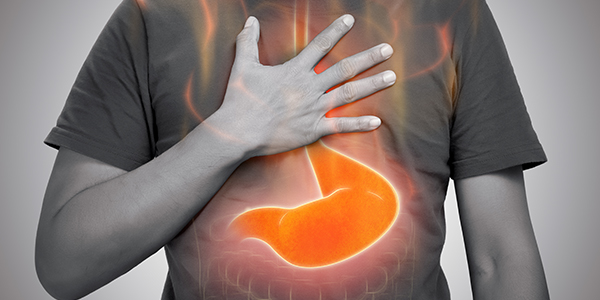The Connection Between Gastric and Digestive Problems and Chest Pain
Chest pain is a symptom that often raises concerns about cardiac issues, but it's important to recognize that gastric and digestive problems can also lead to chest pain. The digestive system is intricately connected to various bodily functions, and disturbances in this system can sometimes manifest as discomfort or pain in the chest area. Understanding the relationship between gastric and digestive problems and chest pain can aid in accurate diagnosis and effective management of these conditions.

Gastric and Digestive Problems: A Broad Spectrum:
Gastric and digestive problems encompass a range of conditions, each with its unique symptoms and effects on the body. Some common issues that can cause or contribute to chest pain include:
Gastroesophageal Reflux Disease (GERD): GERD is a chronic condition where stomach acid frequently flows back into the esophagus. This can lead to heartburn and chest pain, often referred to as acid reflux.
Hiatal Hernia: A hiatal hernia occurs when a portion of the stomach pushes through the diaphragm into the chest cavity. This can cause discomfort, including chest pain.
Peptic Ulcers: Peptic ulcers are open sores that develop on the inner lining of the stomach or the small intestine. When these ulcers irritate the stomach lining, they can cause chest pain.
Gallbladder Issues: Conditions such as gallstones or inflammation of the gallbladder can lead to referred pain in the chest area.
Esophageal Spasms: Uncontrolled contractions of the esophagus can cause chest pain, often mistaken for heart-related pain.
Understanding the Mechanism:
The digestive system shares close proximity with the chest cavity, and its disturbances can lead to sensations of pain that are felt in the chest. Here's how it works:
Acid Reflux: In GERD, stomach acid flows into the esophagus, causing irritation and a burning sensation. This can be perceived as chest pain, sometimes even mimicking cardiac pain.
Referred Pain: Digestive issues can trigger nerve signals that are interpreted as pain in areas other than the source. This is known as referred pain, and it can manifest as chest discomfort.
Diagnosing Gastric and Digestive-Related Chest Pain:
Accurate diagnosis is essential to differentiate between cardiac-related chest pain and that caused by digestive problems. Your healthcare provider may recommend the following steps:
Medical History: A comprehensive understanding of your medical history and symptoms can help identify potential causes of chest pain.
Physical Examination: Your healthcare provider will perform a physical examination to assess your overall health and pinpoint potential sources of discomfort.
Diagnostic Tests: Depending on your symptoms, tests such as upper endoscopy, X-rays, CT scans, or esophageal manometry may be recommended to visualize and assess your digestive tract.
pH Monitoring: In cases of suspected acid reflux, pH monitoring can help measure the frequency and duration of acid exposure in the esophagus.
Managing Gastric and Digestive-Related Chest Pain:
Once the underlying cause is identified, appropriate management strategies can be implemented:
Lifestyle Modifications: Changes in diet, eating habits, and weight management can alleviate symptoms of GERD and other digestive issues.
Medications: Antacids, proton pump inhibitors (PPIs), and other medications can help reduce stomach acid production and alleviate symptoms.
Surgical Intervention: In severe cases or when conservative measures are ineffective, surgical options may be considered to address underlying issues like hiatal hernia.
Frequently Asked Questions (FAQs)
How can I differentiate between cardiac-related chest pain and digestive-related chest pain?
Accurate diagnosis requires medical evaluation. Cardiac pain may radiate to the left arm, neck, or jaw, while digestive pain is often associated with eating and may be relieved by antacids.
What is acid reflux, and can it cause chest pain?
Acid reflux, where stomach acid flows into the esophagus, can cause chest pain often described as burning or discomfort in the chest area.
Are there lifestyle changes that can help manage digestive-related chest pain?
Yes, dietary modifications, weight management, and avoiding triggers like spicy foods or caffeine can help alleviate symptoms of digestive-related chest pain.
When should I seek medical attention for chest pain?
If you experience severe or prolonged chest pain, especially if it's accompanied by shortness of breath, dizziness, or pain radiating down the left arm, seek immediate medical attention.
In conclusion, gastric and digestive problems can indeed cause chest pain, which underscores the need for proper diagnosis and treatment. By understanding the mechanisms involved and seeking medical evaluation, individuals can effectively manage digestive-related chest discomfort and ensure their overall well-being.
